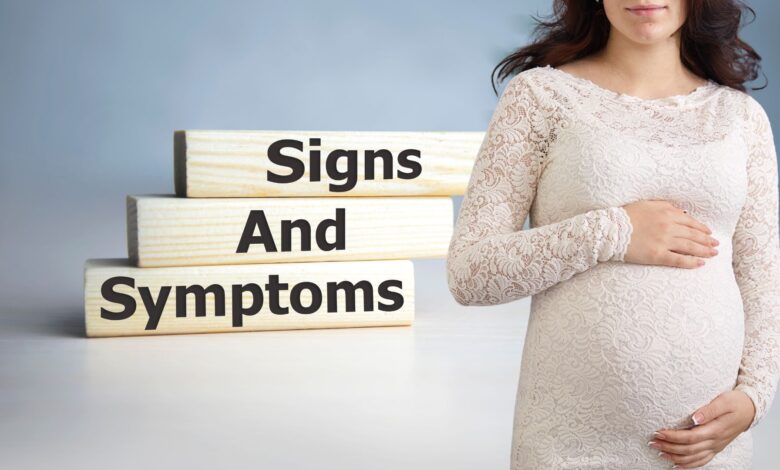Pregnancy symptoms that may indicate serious complications

Pregnancy symptoms can vary widely from person to person, with some experiencing mild discomfort while others may encounter more pronounced changes in their bodies.
Pregnancy is a unique journey filled with various changes and experiences. While many of these changes are normal and expected, some symptoms can signal potential complications. In this article, we will explore different pregnancy symptoms, what’s normal, and when to be concerned.
Normal Changes During Pregnancy
Before delving into potential complications, let’s understand what are typical, albeit bothersome, symptoms during pregnancy. It’s essential to recognize that not all discomforts indicate a problem. Here are some common pregnancy symptoms:
- Swelling: It’s normal to experience mild swelling, which might lead to puffiness in the face, hands, legs, feet, and ankles.
- Digestive Issues: Stomach problems can cause nausea, vomiting, heartburn, gas, and bloating.
- Aches and Pains: Mild aches and pains are common and can often develop as backaches or leg cramps at night.
- Frequent Urination: You may find yourself visiting the bathroom more frequently during pregnancy.
- Oral Health Changes: Swollen gums that may bleed easily can be part of pregnancy changes.
- Skin Alterations: Skin changes like brown spots on the face, stretch marks, or varicose veins can occur.
While these symptoms are typically part of the pregnancy journey, remember, you don’t have to endure them without help. Don’t hesitate to consult your doctor to learn how to manage and alleviate these discomforts.
Complications in Early Pregnancy
During early pregnancy, there are warning signs that should never be ignored. Contact your healthcare provider or go to the hospital immediately if you experience any of the following:
- Severe Pain: If you have severe pain or cramping in your lower abdomen or feel pain in the tip of one shoulder, seek medical attention.
- Bleeding: If you notice any bleeding from your vagina, it’s crucial to get immediate medical help.
- Dizziness or Fainting: Experiencing dizziness or fainting should be taken seriously and requires prompt medical assessment.
Later Pregnancy (After 20 Weeks)
In the later stages of pregnancy, it’s essential to remain vigilant for potential issues. Contact your healthcare provider or head to the hospital right away if you encounter any of the following warning signs:
- Vision Changes: Notify your healthcare provider if you experience changes in your vision, such as flashing lights or blurry eyesight.
- Swelling: Sudden, severe swelling in your hands, feet, or face should be assessed by a medical professional.
- Persistent Headache: If you have a headache that doesn’t improve with pain-relieving medicine, consult your healthcare provider.
- Pain Under Ribs: Pain under the ribs can be a sign of an issue, and you should seek medical advice.
- Extreme Itchiness: If you have intense and unrelenting itching of your skin, don’t hesitate to consult your healthcare provider.
- Persistent Leg Swelling: Swelling in your legs that doesn’t improve overnight requires medical assessment.
Other Alarming Warning Signs of Pragnancy
Several other alarming warning signs require immediate attention:
- Decreased Fetal Movement: If you notice that your baby has stopped moving or is moving less than usual, visit your local hospital without delay.
- Abdominal Injury: In the event of an injury to your abdomen, seek medical help immediately.
- Severe Abdominal Pain: Severe abdominal pain should never be ignored and requires immediate medical assessment.
- Vaginal Bleeding: If you experience bleeding from your vagina, contact your healthcare provider urgently.
Who Is at Risk of Complications?
Finally, it’s worth noting that some individuals may have a higher chance of developing pregnancy complications. This includes those who:
- Had health problems before becoming pregnant.
- Experienced complications in previous pregnancies.
- Have a family history of pregnancy complications.
- Are over 35 years of age.
- Are pregnant with more than one baby.
- Are overweight or obese.
Keep an eye out for pregnancy symptoms that may indicate serious complications, and remember to address issues like depression and anxiety in expectant mums for a healthier pregnancy
FAQ
What are common pregnancy symptoms?
Common pregnancy symptoms include mild swelling, digestive issues (nausea, vomiting, heartburn, gas, and bloating), aches and pains (backaches, leg cramps), frequent urination, oral health changes, and skin alterations (stretch marks, varicose veins).
Are these common symptoms the same for every pregnant person?
While many people experience these symptoms, pregnancy can be unique for each individual. Some may have few discomforts, while others may experience more pronounced symptoms.
When should I consult my doctor about normal pregnancy symptoms?
If you find any of these symptoms particularly bothersome, or if they interfere with your daily life, it’s advisable to consult your doctor for guidance on managing and alleviating them.
What are early pregnancy complications?
Early pregnancy complications include severe pain or cramping in the lower abdomen, pain in the tip of one shoulder, bleeding from the vagina, and experiencing dizziness or fainting. These signs require immediate medical attention.
What should I do if I experience warning signs in later pregnancy?
In later pregnancy (after 20 weeks), warning signs such as vision changes, severe swelling, a persistent headache, pain under the ribs, extreme itchiness, or persistent leg swelling should prompt you to contact your healthcare provider or seek medical attention.
What if I notice a decrease in fetal movement?
If you notice your baby has stopped moving or is moving less than usual, it’s crucial to visit your local hospital without delay for an assessment.
What if I experience abdominal injury or severe abdominal pain?
In the case of abdominal injury or severe abdominal pain, seek immediate medical help. These could indicate a problem that requires attention.
Who is at risk of pregnancy complications?
Several factors can increase the risk of complications during pregnancy, including having pre-existing health conditions, experiencing complications in previous pregnancies, having a family history of pregnancy complications, being over 35 years old, expecting multiple babies, or being overweight or obese.
Should I consult my healthcare provider if I fall into a high-risk category?
If you fall into a high-risk category, it’s especially important to maintain regular contact with your healthcare provider throughout your pregnancy. They can provide guidance and closely monitor your health.
What’s the key takeaway for pregnant individuals?
Be aware of both normal pregnancy symptoms and potential complications. Don’t hesitate to consult your healthcare provider if you have concerns during your pregnancy, and always seek immediate medical attention if you experience any of the warning signs mentioned in the article. Your well-being and that of your baby are of utmost importance.
Conclusion
While pregnancy brings about numerous changes, it’s crucial to be aware of symptoms that may indicate serious complications. Knowing when to seek help can make all the difference, ensuring a safe and healthy journey for both you and your baby. Always consult your healthcare provider if you have concerns during pregnancy, and never hesitate to seek immediate medical attention if you experience any of the warning signs mentioned here.



